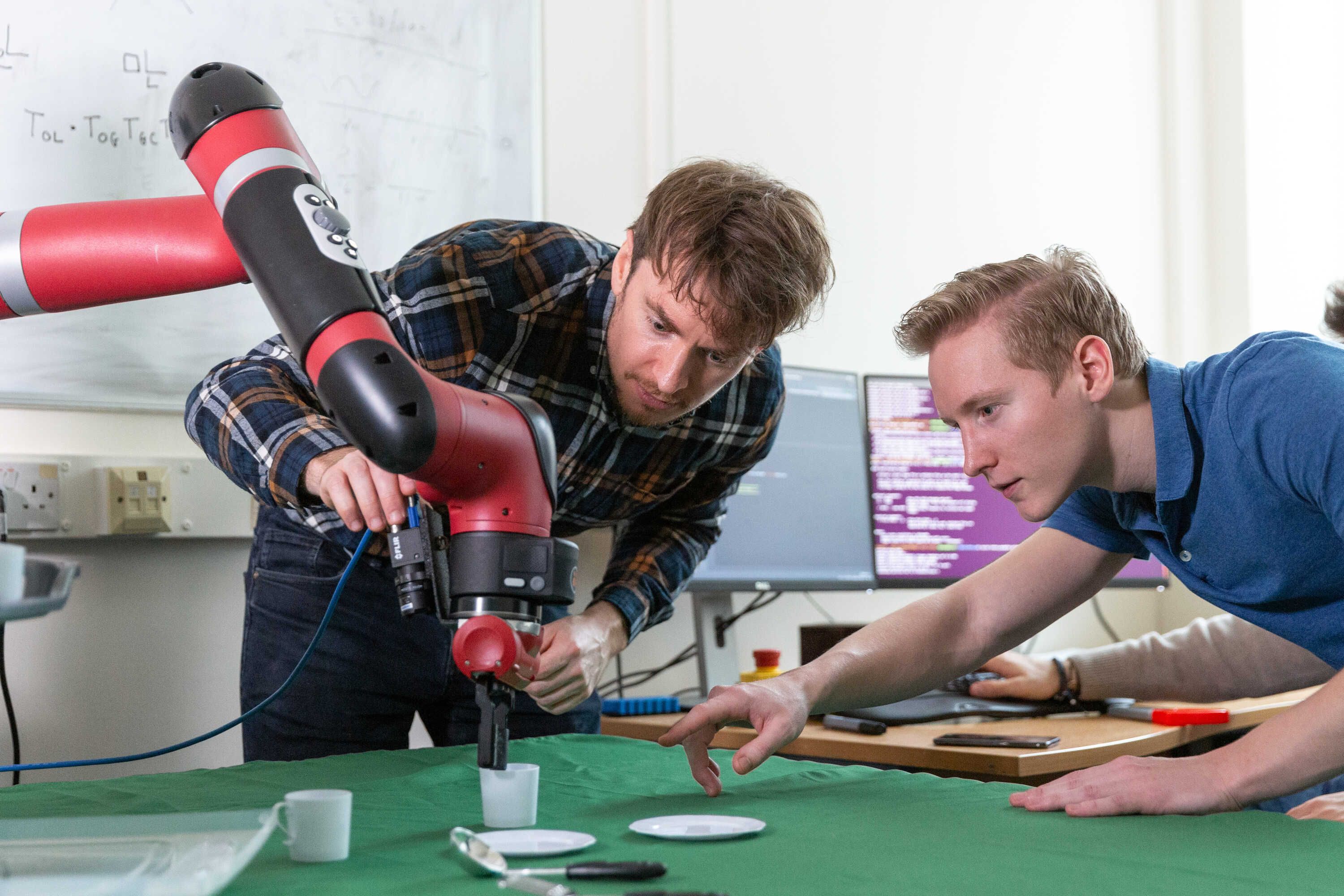
Computing (Visual Computing and Robotics)
Specialise in the study of vision, graphics, intelligent behaviour and biomedical image computing.
Specialise in the study of vision, graphics, intelligent behaviour and biomedical image computing
Build your practical skills and research expertise on an individual project
Course key facts
-
Qualification
-
MSc
-
-
Duration
1 year
-
Start date
September 2025
-
Study mode
Full-time
-
Fees
£23,400 Home
£43,800 Overseas
-
Delivered by
-
Location
-
South Kensington
-
Minimum entry standard
-
First-class Honours in a subject with a substantial Computing component
Course overview
Specialise in the study of vision, graphics, intelligent behaviour and biomedical image computing on this Master's course.
Examine emerging trends in computing and how these techniques can be adapted in industrial applications. Practical programming training using Prolog and Matlab will be provided.
You'll also enhance your management and research skills on an individual project exploring an area of visual computing or robotics.
We also offer the following MSc Computing specialisms for those looking to advance their knowledge of other areas of computing:
- Artificial Intelligence and Machine Learning
- Management and Finance
- Security and Reliability
- Software Engineering
- Visual Computing and Robotics (this course)
Structure
This page is updated regularly to reflect the latest version of the curriculum. However, this information is subject to change.
Find out more about potential course changes.
Please note: it may not always be possible to take specific combinations of modules due to timetabling conflicts. For confirmation, please check with the relevant department.
You’ll take one core module.
Core modules
Demonstrate independence and originality on an individual project, specialising in an area of visual computing and/or robotics.
You’ll choose nine optional modules in total: at least two from Group A; between three and seven from Group B; and up to three from Group C.
This is an indicative list of the modules you can expect to choose from.
Group A
Assess modern techniques in realistic computer graphics and image synthesis, particularly image-based techniques for photorealism.
Cover fundamental concepts of machine learning for imaging and relate them to real-world problems in computer vision and medical image analysis.
Engage with the emerging field of robot learning and discover how robots can acquire skills and control their bodies using machine learning techniques.
Examine how probability can be used to make decisions by a computer and advance your understanding of inference networks and linear and non linear methods in statistical pattern recognition.
Explore the intersection of robotics and human-computer interaction, covering user-centric and user study design, data analysis, and relevant theoretical foundations, in this exciting new field.
Group B
Develop a thorough understanding of high-performance and energy-efficient computer architecture as a basis for informed software performance engineering.
Understand basic concepts of computer graphics; and familiarise yourself with the mathematical principles used for computer generated imagery, shading and light approximations.
Examine the approaches that enable the rapid and systematic design of custom computers and learn how to analyse the performance of a custom computer.
Explore the fundamental concepts and advanced methodologies of deep learning and relate them to real-world problems.
Learn how to design and implement modern statistical machine learning methodologies, as well as inference mechanisms.
Analyse areas of probabilistic model checking and probabilistic program analysis and become proficient using this modelling.
Advance your knowledge of the concepts that enable the design and implementation of scalable distributed systems.
Learn how to describe the core principles of autonomous systems learning and calculate mathematical solutions to problems using reinforcement learning theory.
Gain insights into the different types of problems that exist in machine learning and the basic algorithms used to address them.
Explore how images are formed, how they are represented on computers and how they can be processed by computers to extract semantic information.
Assess the exciting field of mobile robotics, at a time when cutting-edge robots are beginning to leave the research laboratory to tackle real-world tasks.
Gain a flavour of different aspects of the broad and ever-expanding field of graph theory and learning, including conventional graph data analysis methods and the nascent field of graph neural networks.
Group C
Unpick the key concepts, problems and results in distributed algorithms and gain practical experience of programming them.
Gain an in-depth understanding of thestate-of-the-art of logic-based learning, starting from its key foundation concepts and principles before moving to more recent advances.
Study network and web security broadly from the network to the application layer and understand the main threats, attack techniques and defences relevant to cybersecurity and network security.
Analyse how performance engineering ensures computer systems are responsive, scalable, and efficient and explore the fundamental principles and techniques used to achieve these goals.
Deepen your knowledge of the themes and challenges of host-level native, web, and mobile security and privacy.
Discover how to describe the complexity classes associated with computational problems, and how to fit a particular problem into a class of related problems.
Understand the basic concepts of quantitative finance and financial engineering and build awareness of the major decision, hedging, and pricing problems in finance.
Develop a deeper understanding of optimal decision making models, algorithms and applications to engineering, finance, and machine learning.
Acquire the techniques and tools needed to devise and develop natural language processing (NLP) components and applications.
Analyse the foundational principles behind decentralised ledgers and apply them to current research in cryptocurrencies.
Become familiar with the concepts and techniques underlying privacy-enhancing technologies across a variety of areas.
Learn how to design program analyses for classical and probabilistic programs and how to solve the resulting equations and constraints.
Study basic notions of quantum computing and mechanics from a computer science viewpoint.
Use separation logic to reason compositionally about sequential and concurrent heap-manipulating programs.
Assess techniques and tools for improving the reliability of software systems and discuss their respective strengths and weaknesses.
Discover why knowledge representation and reasoning are sential components of an intelligent system and are at the core of artificial intelligence research.
Develop intellectual and practical skills in the use of modal logics for knowledge representation and automated reasoning in Artificial Intelligence.
Study an advanced computer science topic of your choice and plan, write and present a scientific report.
Become familiar with Prolog and develop the knowledge and skills required to write small Prolog applications with an artificial intelligence dimension.
Assess the best decision algorithms for solving real-life problems arising in computer science, computational management and economics.
Teaching and assessment
Teaching and learning methods
-
Lectures
-
Tutorials
-
Practical work
-
Laboratory
-
Group work
-
Research project
Assessment methods
-
Written exams
-
Coursework
-
Lab work
-
Presentations and demonstrations
-
Technical report
-
Dissertation
Entry requirements
How to apply
Apply online
You can submit one application form per year of entry. You can choose up to two courses.
There is no application fee for MRes courses, Postgraduate Certificates, Postgraduate Diplomas, or courses such as PhDs and EngDs.
If you are applying for a taught Master’s course, you will need to pay an application fee before submitting your application.
The fee applies per application and not per course.
- £80 for all taught Master's applications, excluding those to the Imperial College Business School.
- £100 for all MSc applications to the Imperial College Business School.
- £150 for all MBA applications to the Imperial College Business School.
If you are facing financial hardship and are unable to pay the application fee, we encourage you to apply for our application fee waiver.
Find out more about how to apply for a Master's course, including references and personal statements.
An ATAS certificate is not required for students applying for this course.
Tuition fees
Home fee
2025 entry
£23,400
You should expect and budget for your fees to increase each year.
Your fee is based on the year you enter the university, not your year of study. This means that if you repeat a year or resume your studies after an interruption, your fees will only increase by the amount linked to inflation.
Find out more about our tuition fees payment terms, including how inflationary increases are applied to your tuition fees in subsequent years of study.
Whether you pay the Home or Overseas fee depends on your fee status. This is assessed based on UK Government legislation and includes things like where you live and your nationality or residency status. Find out how we assess your fee status.
If you're a UK national, or EU national with settled or pre-settled status under the EU Settlement Scheme, you may be able to apply for a Postgraduate Master’s Loan from the UK government, if you meet certain criteria.
For courses starting on or after 1 August 2024, the maximum amount is £12,471.
The loan is not means-tested and you can choose whether to put it towards your tuition fees or living costs.
Overseas fee
2025 entry
£43,800
You should expect and budget for your fees to increase each year.
Your fee is based on the year you enter the university, not your year of study. This means that if you repeat a year or resume your studies after an interruption, your fees will only increase by the amount linked to inflation.
Find out more about our tuition fees payment terms, including how inflationary increases are applied to your tuition fees in subsequent years of study.
Whether you pay the Home or Overseas fee depends on your fee status. This is assessed based on UK Government legislation and includes things like where you live and your nationality or residency status. Find out how we assess your fee status.
If you're a UK national, or EU national with settled or pre-settled status under the EU Settlement Scheme, you may be able to apply for a Postgraduate Master’s Loan from the UK government, if you meet certain criteria.
For courses starting on or after 1 August 2024, the maximum amount is £12,471.
The loan is not means-tested and you can choose whether to put it towards your tuition fees or living costs.
How will studying at Imperial help my career?
Get the advanced training required to pursue a specialist career in visual computing or robotics.
A degree in Imperial Computing will open up a variety of career opportunities in other areas of IT and computing.
Graduates are sought after in roles such as application/web development, networking, AI, media, finance, robotics, and computer games.
Other potential career paths include chip design, cyber security, data management, bio-medical systems and transport.
Further links
Contact the department
- Telephone: +44 (0) 20 7594 8298
- Email: doc-mscadmissions@imperial.ac.uk
Course Director: Robert Craven
Visit the Department of Computing website.

Request info
Find out more about studying at Imperial. Receive updates about life in our community, including event invites and download our latest Study guide.

Events, tasters and talks
Meet us and find out more about studying at Imperial.

Terms and conditions
There are some important pieces of information you should be aware of when applying to Imperial. These include key information about your tuition fees, funding, visas, accommodation and more.
You can find further information about your course, including degree classifications, regulations, progression and awards in the programme specification for your course.
Programme specifications